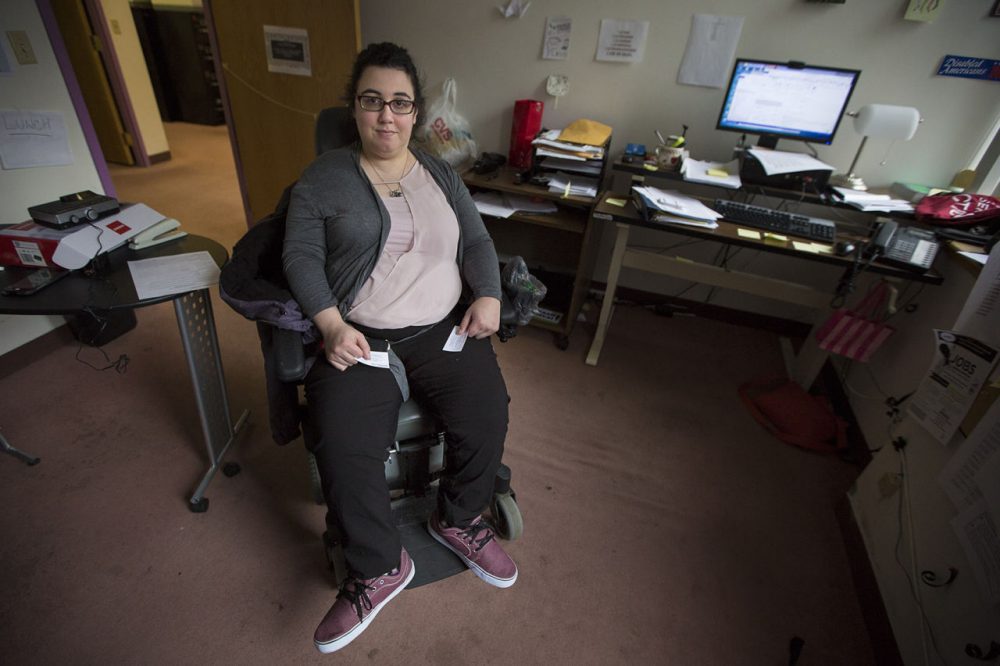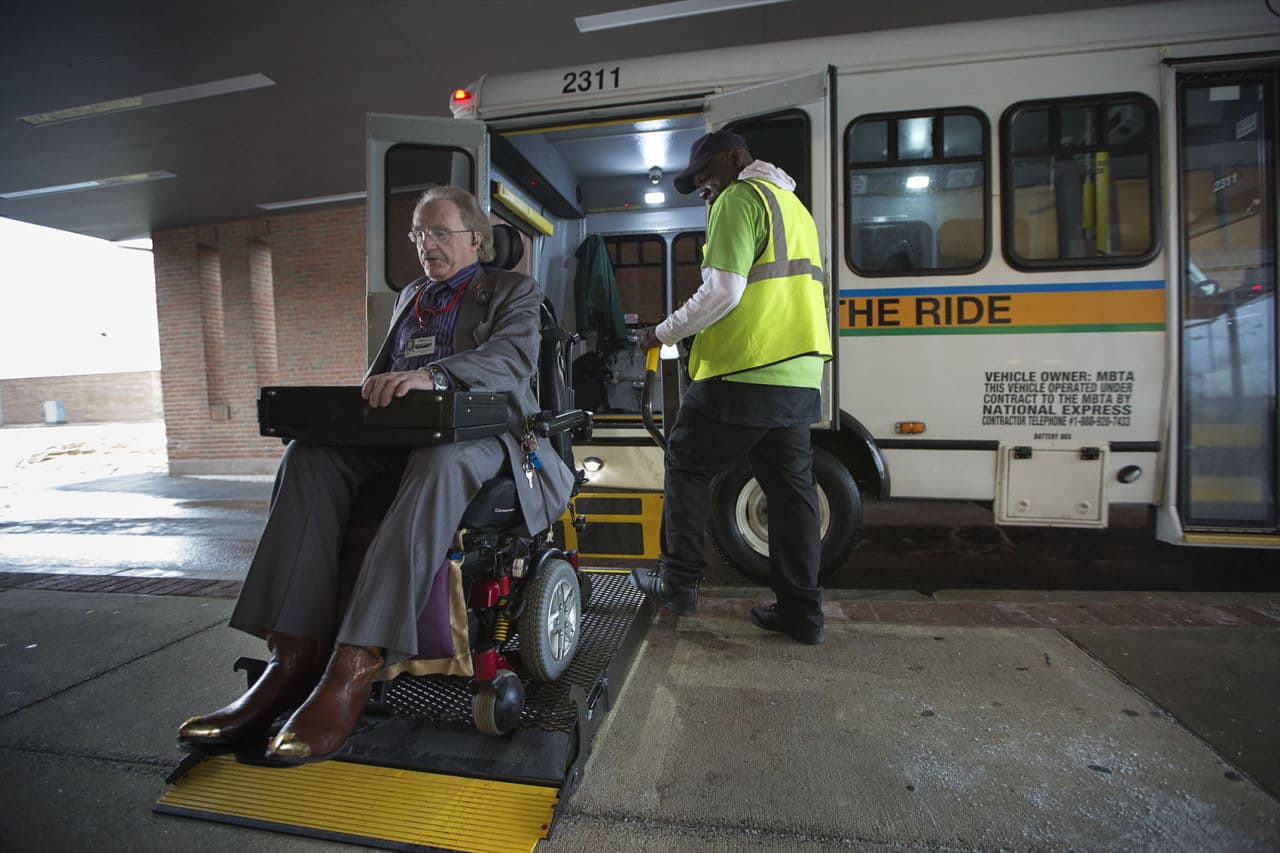Advertisement
With More Fare Hikes Coming, MBTA Eyes Partnerships For The Ride Service
Resume
With fare increases coming this summer, the MBTA and transit advocates are looking for ways to help some of the system's most vulnerable riders — and help bring down the agency's costs.
Efforts are focused on The Ride, the T’s paratransit program, which serves people with disabilities and the elderly.
It's an expensive service with many challenges. And it's expected to see more demand as the population ages.
The Trip From Lynn To Boston
For Ride user Sarah Kaplan, every day must be planned out 24 hours in advance — if she wants to be able to leave her apartment in Lynn.
The 32-year-old was born with cerebral palsy and is in a power wheelchair. She relies on The Ride to get around.
Her day typically begins the night before, when she receives a message from the MBTA informing her of her Ride pickup time for the next day.
"I can’t imagine being able to have a full-time job without it," Kaplan said. "Without it, every time it rained I’d have to call out because it just wouldn’t be safe for me."
On a recent morning, Kaplan quietly typed away on a laptop while she waited for The Ride. She was getting ready to head to work in downtown Boston, where she’s an internship coordinator at the Boston Center for Independent Living.
After a few minutes, she got the call. Her Ride was there.
"Less than five minutes late, good for them…” Kaplan said with a laugh as she closed her computer. She said she's generally happy with the service.
Kaplan's personal care assistant helped her put on a puffy purple coat, which matched her purple sneakers. Outside her apartment, The Ride driver lowered a lift to get Kaplan into the white van. Once inside she was buckled in and her wheelchair strapped down to secure it. Then she was off to work.
Kaplan said she’s not sure how the recently approved fare increases will affect trips like this.
"For me on a daily basis, it might. I don’t know," Kaplan said. "I’m going to have to see what it means. I’m going to have to do the math ... it will probably mean I use the service a little bit less, or I use it differently."
The T Is Looking At Private Partnerships
When MBTA fares go up July 1, The Ride will go from $3 to $3.15. In areas more than three-quarters of a mile from a T station or bus stop, the fare goes from $5 to $5.25 -- half the increase the MBTA originally proposed.
Still, some say the increase will be a challenge for Ride users — many of whom are low-income.
"We know that people are struggling to meet basic needs, so any increase in transportation is going to have an impact, and unlike other modes of transit there is no monthly package or monthly pass for The Ride," said Carolyn Villers, the executive director of the Massachusetts Senior Action Council.
Villers said her group is pushing for an income-based fare. She called the recent fare hike "modest," but said many people who use the service haven't fully bounced back from increases to The Ride in 2012, when fares were doubled from $2 to $4, though were later reduced by a dollar after pushback from advocates and a sharp drop in ridership.
To help those most burdened by the fare increase, the MBTA is trying to find alternatives for Ride users. That would save money both for customers and the transit agency.
The T spends about $46 to subsidize each trip on The Ride, compared with just $0.61 for each subway ride on the Orange, Red and Blue lines. Last fiscal year, that amounted to $97 million for more than 2 million rides.
Michael Lambert, the deputy administrator for transit for MassDOT and the T, said transit officials are looking to private partnerships to ease the cost of The Ride.
"We are trying to create the incentive, trying to create the business case for companies to adopt and include accessible vehicles," Lambert said. "If a taxi company were to include a significant number of accessible vehicles in their fleet, that company would become very attractive to our customers and would almost be guaranteed a level of demand that would certainly help defray the cost of the vehicles and more likely turn a profit."
The T has a pilot program that allows Ride customers to hail subsidized rides with handicapped-accessible taxis at cheaper prices. The T plans to expand the program in the summer. The transit agency is also working with ride-hailing companies Uber and Lyft to offer a similar service. Lambert said the state would cover up to 80 percent of the cost of handicapped accessible vehicles to companies that purchase them.
And the T is encouraging eligible Ride customers to use free transportation provided by MassHealth.

Jim White, the chair of the Access Advisory Committee to the MBTA, called these efforts a win-win, but he added these alternatives need to have strong safety protocols, and he's working to make that happen.
White also said the transit system needs to become more accessible, because oftentimes disabled riders can’t access stations.
"Boston’s MBTA system, being one of the oldest systems in the country, hasn’t quite caught up to being fully accessible," White said. "That’s why paratransit system is there."
This month, the T will reopen the Government Center station after a two-year, $82 million renovation project to make it more accessible. And the T has longer-term plans to make more stations accessible to disabled riders.
The MBTA is facing a $138 million operating budget deficit for the next fiscal year, and an estimated $7 billion maintenance backlog.
Kaplan, The Ride user from Lynn, doesn't feel a taxi or an Uber would be able to accommodate her wheelchair.
She says The Ride will always be a necessary service for her.
"If it rains tomorrow, I either have to run out in the rain and hope that it doesn't kill my chair, or I have to call my boss and tell him that I'm not coming to work. Those are the choices I have," Kaplan said. "The Ride has to be here even if the entire system becomes accessible. The Ride has to be here for the days I need it."
After just over an hour on The Ride, Kaplan arrived at her downtown office. She was 15 minutes late. But, she said, without the service there’d be many more problems.
This article was originally published on March 15, 2016.
This segment aired on March 15, 2016.
